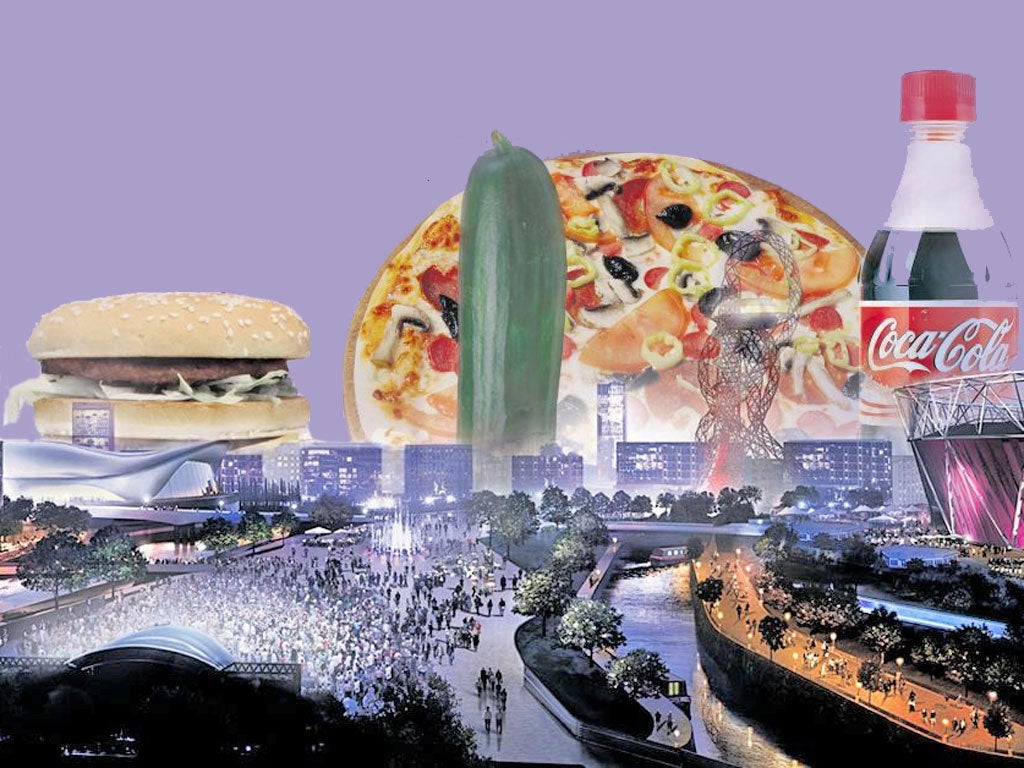Winners' dinners: How will hordes of hungry Olympic athletes – and crowds of spectators – be fed?

The past may very well be a foreign country, but when Britain last held the Olympic Games in 1948 it might as well have been on another planet. Back then we spent a mere £700,000 on the games. Scouts carried messages between officials, and brought cups of tea for the runners. Everyone still had a ration book, and every British male competitor got a free pair of Y-fronts and a cup of Horlicks. Today the games costs closer to £9bn, Horlicks is off the menu and the only pants given to athletes are from sponsors, and some even get a hefty cheque for donning them.
One thing remains unchanged, though: the logistical difficulty of feeding the thousands of spectators, and battalions of competitors and hungry officials. Back then they settled things by asking incoming teams to bring their own food (the French brought steak and claret; the American's eschewed the UK's Spam and whale meat and brought waffles, syrup, eggs and bacon).
Bringing your own lunch won't be an option in 2012. "With an expected 14 million meals to be served across 40 different locations at an Olympics, which comprises 850,000 spectators and 16,500 competitors, the Games is the largest peace-time catering operation in the world," says a spokesman for the 2012 Organising Committee.
Just visualising the food needed for the athletes alone takes a leap of imagination. American swimmer Michael Phelps may not be your average in many sense, but the volume of food he consumed before and during the 2008 Beijing games is pretty typical of his ilk.
Breakfast for the eight-time gold-medal winner? Three fried egg sandwiches, a five-egg omelette, three chocolate-chip pancakes, followed by three pieces of French toast. Lunch consisted of a 1lb of pasta and two ham and cheese sarnies. Dinner was the same amount of pasta, but this time with a pizza chaser. Multiply that by 16,500 and you get the gist... and end up feeling quite dizzy.
And then, of course, there are the spectators to think about; not much fewer than a million of them. As well as the sheer number of people to feed and the quantity of food necessary to do that, there are those ever-present catering problems that any restaurateur would recognise. How do you fit with your customers' schedule? How do you keep the kosher food kosher, halal meat halal and make sure no beef goes in the vegan curry? And, most of all, how do you ensure this Olympiad of eating doesn't cause food deserts elsewhere? The answer is, planning; lots of it.
The food vision for the games was laid out by the organisers back in 2009. It was notable for one thing: its ambition to sustainability. At the time there was a certain amount of sneering along the who–do-you-think-you-are-kidding lines. But it has proved a major triumph, as Tim Lang, professor of food policy at City University points out. "I was opposed to the Olympics... But, that said, the achievements of the London Food Board and Rosie Boycott [the board's chair] in getting the games to be as sustainable as possible is brilliant."
"The sustainable fish initiative – which ensures that all fish served is demonstrably sustainable – is remarkable and sets new world standards. And the effort to get communities around the Olympic village to attempt the hard slog of growing their own food is a fantastic example of collective action. They have pushed the boundaries," he says.
Certainly some criticism does persist, though. The main food sponsors, Cadbury, Coca-Cola and McDonald's may, respectively, be using only fair-trade cocoa, reducing their packaging waste, and locally sourcing beef and sustainable fish. But some question their presence at a festival of athletic excellence altogether. The British Medical Association has referred to McDonald's sponsorship as "unfortunate" in the past.
Though the mild censure seems to have gone unheeded. McDonald's, an Olympic sponsor since 1976, is building its biggest restaurant, a 3,000sq m, two-storey joint, cheek-by-jowl with the Olympic village. That at least means there won't be a repeat of the 1968 Grenoble Olympics, when the company airlifted burgers to US competitors presumably unused to the whiffy cheese and garlic.
The ticket terms are also a source of controversy. Spectators are banned from bringing containers with more than 100ml through the airport-style security. There are also restrictions on food being brought from outside (although both rules are said to be "under discussion").
"It does look slightly like this is being done to maximise catering income," says Football Supporters' Federation chairman Malcolm Clarke. "I'd like to see the set-up mirror that of cricket matches, where you can take your own food and drink."
It remains to be seen whether the games will live up to their avowed vision of being "tastier, healthier and greener". But one thing is sure – there won't be any whale meat or Spam on the menu.
The Games: Grub's up
The lunchpacks at the Atlanta Games in 1996 included a cheese and turkey hoagie, vegetable paté, carrot sticks, pasta salad, breadsticks, an orange, an apple, a granola bar and pudding.
Japanese organisers also served 30 different types of breads with the meals and made 50,000 lunchboxes for competitors who didn't feel inclined to visit the golden arches.
Dog meat was banned in Beijing during the 2008 Olympics. Officially designated Olympics restaurants were required to take it off the menus and waiters were told to politely suggest alternatives to customers.
Usain Bolt, the fastest man on Earth, claimed he was fuelled by Chicken McNuggets when he won the 100m gold medal at Beijing.
At the Winter Olympics in Nagano, Japan, in 1998, McDonald's sold nearly 74,000 burgers, along with 189,000 Chicken McNuggets, 11,000 egg McMuffins and 21,000 medium orders of McDonald's fries. And that was just to the competitors.
WILL HAMILTON
Join our commenting forum
Join thought-provoking conversations, follow other Independent readers and see their replies
Comments